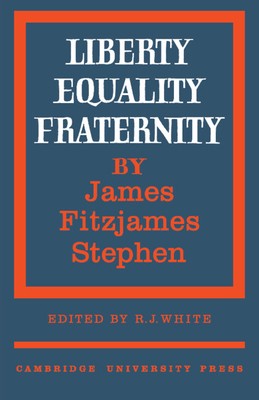
- We will send in 10–14 business days.
- Author: James Fitzjames Stephen
- Publisher: Cambridge University Press
- ISBN-10: 0521180821
- ISBN-13: 9780521180825
- Format: 14 x 21.6 x 1.7 cm, minkšti viršeliai
- Language: English
- SAVE -10% with code: EXTRA
Reviews
Description
R. J. White's edition, which was originally published in 1967, made Fitzjames Stephen's classic available for the first time since 1914. The editor made use of the 1874 second edition which included Stephen's notes in reply to his original critics. Stephen's work is written as a systematic denunciation of John Stuart Mill's political thought. It is thus of great importance in the history of Utilitarianism, and also as the most forthright and systematic of the Victorian attacks on democracy. Stephen's work is also important for its repudiation of the progressive attitudes to religion and morality characteristic of the Comptist philosophy which had attracted Mill. Stephen's aim was to show that 'no room is left for the order of ideas hinted at by the phrase 'Liberty, Equality, Fraternity''. He argues his case with legal precision and considerable rhetorical powers.
EXTRA 10 % discount with code: EXTRA
The promotion ends in 21d.04:56:18
The discount code is valid when purchasing from 10 €. Discounts do not stack.
- Author: James Fitzjames Stephen
- Publisher: Cambridge University Press
- ISBN-10: 0521180821
- ISBN-13: 9780521180825
- Format: 14 x 21.6 x 1.7 cm, minkšti viršeliai
- Language: English English
R. J. White's edition, which was originally published in 1967, made Fitzjames Stephen's classic available for the first time since 1914. The editor made use of the 1874 second edition which included Stephen's notes in reply to his original critics. Stephen's work is written as a systematic denunciation of John Stuart Mill's political thought. It is thus of great importance in the history of Utilitarianism, and also as the most forthright and systematic of the Victorian attacks on democracy. Stephen's work is also important for its repudiation of the progressive attitudes to religion and morality characteristic of the Comptist philosophy which had attracted Mill. Stephen's aim was to show that 'no room is left for the order of ideas hinted at by the phrase 'Liberty, Equality, Fraternity''. He argues his case with legal precision and considerable rhetorical powers.


Reviews